“Too Short a Season”
Written by Michael Michaelian and D.C. Fontana
Directed by Rob Bowman
Season 1, Episode 15
Production episode 40271-112
Original air date: February 8, 1988
Stardate: 41309.5
Captain’s Log: The Enterprise has been sent to deal with a situation on Mordan IV, a planet that has just ended four decades of civil war. They pick up Admiral Mark Jameson, who negotiated a hostage crisis on Mordan 45 years earlier. They now have another one: the Federation ambassador and his staff have been taken hostage by dissident terrorists, who will not negotiate with Karnas, the planetary governor.
Jameson is very old, and we know this because Clayton Rohner has been dipped in enough latex to keep Trojan in business for decades. He’s also in a wheelchair—suffering from something called Iverson’s Disease—and has an old wife. In his quarters, he has an attack of some kind, which surprises his wife—as does the fact that he’s had such attacks before.
Then, to everyone’s surprise—especially Crusher’s—Jameson gets up from his wheelchair on the bridge. Iverson’s has no cure and has never gone into remission, so Crusher isn’t sure what’s going on. But he starts getting younger—and has another attack. Crusher finds an unknown substance in his bloodstream, his red blood cells are running rampant, his DNA is skewed, and latex keeps falling away from his face.
It turns out that Jameson negotiated a treaty on Cerberus II years ago, and used the goodwill from that to obtain a drug that would reverse the aging process. It’s a two-year drug regimen, and he’d obtained enough for both him and his wife, but when this mission came up, he took both doses all at once. He felt he needed to be at his strongest to deal with this situation.
Jameson contacts Karnas on a secure frequency, hoping to get more information. It soon comes out that there are no dissidents, and that Karnas took the hostages himself, and he wants revenge on Jameson.
Now Jameson changes his strategy: he’s taking an armed rescue squad in. Picard wants to know why he’s made this decision. A now-youthful Jameson tells the truth. Forty-five years earlier, Jameson was sent in to negotiate for the release of Federation citizens Karnas took hostage in order to obtain weapons. Officially, he succeeded; in truth, he secured the hostages’ release by giving Karnas exactly what he wanted. He gave the same weapons to Karnas’s enemies—”my interpretation of the Prime Directive.” His feeling was that they’d have a brief war at best—instead, the civil war lasted forty years.
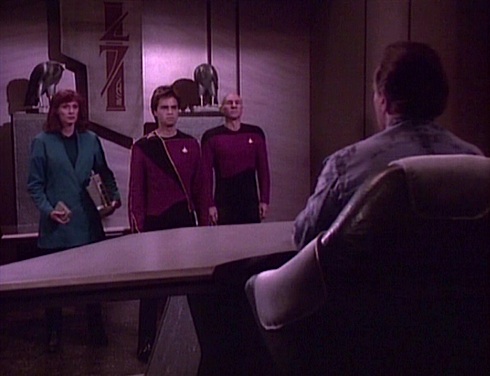
The admiral leads his raid—with Picard, in an odd burst of testosterone, insisting on accompanying. The team is ambushed by Karnas’s troops and beam back to the ship, but Karnas demands Jameson, who is now deteriorating rapidly. Jameson beams down, with Picard and Crusher, and—after a tiresomely lengthy convincing of Karnas that yes, this is really Jameson—Karnas announces his intention to kill Jameson on the ravaged world that he created.
Picard points out Karnas’s own responsibility for the carnage, and it all becomes moot as Jameson dies from the youth drug. Karnas frees the hostages, Jameson’s wife asks him to be buried on Mordan IV for no compellingly good reason, and the Enterprise flies off.
Thank You, Counselor Obvious: “Because there are lives at stake, Mrs. Jameson.” Troi’s answer to the question as to why Admiral Jameson took the youth drug. It’s also wrong on pretty much every level, since his decision was entirely selfish and motivated by guilt.
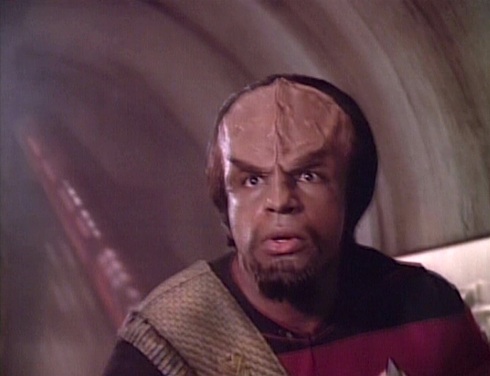
There Is No Honor In Being Pummeled: Worf gets to shoot things a lot, but amusingly, his only line of dialogue in the entire episode is, “Sir, look out!” yelled right before he keeps Jameson from getting shot by tackling him.
No Sex, Please, We’re Starfleet: As he youthifies himself, Jameson tries to make nookie with his still-elderly wife, who rebuffs him. You’d think she’d want to kiss him more with less latex on his face….
Welcome Aboard: Michael Pataki makes a triumphant return to Star Trek, having played the angry, drunken Korax in “The Trouble with Tribbles,” now playing the angry, vengeful Karnas. He’s far stronger than Clayton Rohner as Jameson, who mistakes a scratchy voice and being a little shaky for playing an 85-year-old, and isn’t any better when he’s young. Marsha Hunt creates no impression whatsoever as Jameson’s wife.
I Believe I Said That: “They’re phasers, sir, set on ‘kill’.”
“Thank you, Mr. Data, I have heard the sound before.”
Data stating the obvious (with a contraction, no less!), and Picard calling him on it.
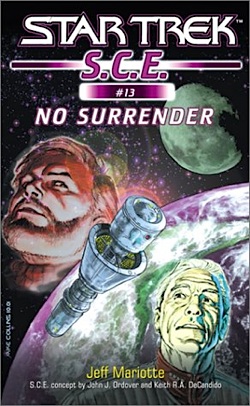 Trivial Matters: In the Starfleet Corps of Engineers series, Captain David Gold is established as having served under Mark Jameson on the Gettysberg. In No Surrender by Jeff Mariotte, it’s established that another shipmate, Augustus Bradford, who practically worshipped then-Captain Jameson, left Starfleet in disgust after the events of this episode came to light and he learned that his hero had feet of clay.
Trivial Matters: In the Starfleet Corps of Engineers series, Captain David Gold is established as having served under Mark Jameson on the Gettysberg. In No Surrender by Jeff Mariotte, it’s established that another shipmate, Augustus Bradford, who practically worshipped then-Captain Jameson, left Starfleet in disgust after the events of this episode came to light and he learned that his hero had feet of clay.
Make it so: “The story you are telling me is unbelievable!” I have to confess to liking this episode in spite of itself. It’s, at the very least, a decent script, with an interesting character in Jameson and a good history for Mordan IV. In particular, Karnas’s anger is palpable, and understandable under the circumstances.
Unfortuantely, far too many factors undermine it, starting with Clayton Rohner, who is simply horrible as Jameson, additionally saddled with the worst old-age makeup in the history of the universe. The relationship between him and his wife is depressingly traditional—in fact, it’s mired in 1950s clichés, since there’s no indication that she does anything but be his wife.
The lengthy scene where Picard has to convince Karnas that the young man in front of him is Jameson—when Jameson now must look like he did when Karnas first met him—is padding at its worst, as the scene takes too long and is wholly unnecessary.
Finally, it’s not really a Next Generation episode. It’s a story about an old man who has been carrying guilt for four decades over something stupid he did in his youth, and he tries to recapture his youth in a move of even greater stupidity. It’s even almost a good story about that.
Ultimately, it’s a missed opportunity.
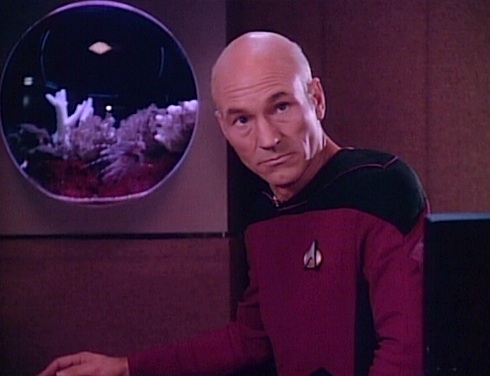
Warp factor rating: 5.
Keith R.A. DeCandido‘s latest novel, Unicorn Precinct, is currently available for the Kindle, and will be available in other eBook formats, as well as trade paperback, from Dark Quest Books in July. It’s the long-awaited sequel to his 2004 novel Dragon Precinct, which will be re-released by DQB later this year. None of this has anything to do with Star Trek, as these are high fantasy police procedurals. But I’m proud of them, so nyah.










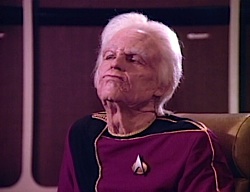
“the relationship between him and his wife is depressingly traditional.”
In an episode as crammed with plot as this, I don’t really think there’d be much room for the First Season-obligated “But oh, we are so SUPERIOR to those viewers watching in the present” scene. Frankly, I don’t miss it. Merely depicting a “traditional” relationship !=advocating it, after all.
I didn’t want a scene like that, John, but I would’ve liked a human husband-wife relationship in the late 24th century that didn’t seem dated when the episode aired in the late 20th.
—Keith R.A. DeCandido
I get the feeling the only reason the wife was even written into the episode was as a very weak attempt at making Jameson seem sympathetic because someone loves him, so he doesn’t just seem like a selfish screw-up. Or something. Anything beyond that probably never entered the writer’s mind, much less any thought of “HA! I am glorifying marriages where one spouse is dominant!” *grin*
As a kid, this episode often did leave me with the feeling that the Enterprise crew were acting like guest stars on their own series.
Having looked at the episode order I find the last first season is one of favorites because it’s kind of a “F@Ck YOU to all those were smarter than the veiwer scripts.
I don’t think I’ve watched this episode since its debut. It was hardly worth seeing again. It didn’t even have a good musical score; instead of McCarthy or Jones, the score was by a newcomer named George Romanis, who was never brought back.
The reverse-aging plot is problematical on many levels. For one thing, there’s the horrible makeup and miscasting, as you say, Keith. For another, it was incongruous to have a man in his 80s treated as a decrepit wreck when “Farpoint” had shown us a 137-year-old Leonard McCoy, indicating that lifespans were longer in the 24th century (and when Patrick Stewart was playing a man 10 years older than himself, though I don’t think that had been clearly established yet at this point). I always considered that a failure of futurism, and it’s inconsistent with later episodes that similarly establish a human life expectancy of around 140. Also, it suffers from the problem of introducing what should be a revolutionary, world-shaking breakthrough that’s never heard from again after one episode. Sure, it tries to establish it as dangerous and unlikely to succeed, but if the process exists, it could be studied and improved upon.
I question whether the story really needed the reverse-aging gimmick at all. It didn’t really contribute anything to the story of Jameson’s crime and redemption. It was just a sci-fi gimmick tacked onto the story because a sci-fi gimmick was considered obligatory.
Come to think of it, why was the age makeup so awful here? Before he became known as the Trek alien guy, I believe that age makeup was considered Michael Westmore’s specialty, and I think he won awards for it. Maybe the production schedule was just too rushed for him to do it well. I’ve heard that “Farpoint”‘s McCoy makeup had the same problem — Westmore had to use a forehead appliance left over from an earlier production because he didn’t have time to sculpt one specifically for DeForest Kelley, and that’s why Bones didn’t look quite right.
“The relationship between him and his wife is depressingly traditional
– in fact, it’s mired in 1950s clichés, since there’s no indication that she does anything but be his wife.”
She’s A) retirement age and B) taking care of a disabled spouse. For all we know she’s got a Nobel prize, and she’s spending her years of hard earned rest following around a man who’s body is deteriorating rather rapidly because she, I dunno, maybe loves him.
But she’s not the central character, and in a forty minute story it would take way too long to come up with an excuse for her to break off her trilithium lab research on Starbase 23, shuttle over, show up remarkably *just in time* for his attack, explain the previously egalitarian nature of her relationship to her husband with Troi and how it’s all gone to hell since he got sick and how she may have to quit her job because the caretakers weren’t even able to ensure that he didn’t get his hands on illegal drugs, and then deal with his emerging dementia as he tries to force her to kiss the new man he’s becoming. Because the plot was about A) Jameson and B) the negotiation. The wife served as the chorus. Somebody has to be the chorus.
Sihaya: Yeah, but she wasn’t even an interesting chorus. There was nothing there. Why did she love this guy so much? Why did she put up with his nonsense and his ego and his stupidity? What was so special about him or about her or about either of them for their relationship to matter.
Take Spock’s mother Amanda, another D.C. Fontana hausfrau — whom I have always found to be a terrible character, though I know that puts me in the minority (though all of the interesting things that were done with her were in tie-in fiction and fanfic). The reason why she’s remembered fondly is because Jane Wyatt imbued her with passion and personality. Marsha Hunt is no Jane Wyatt.
Of course, the real problem with this episode is that we don’t know or care about the Jamesons at all. This story would’ve worked better if Picard was the one who had the negotiation that went south decades earlier — or, if they didn’t want to give a main character that ugly a past (which Roddenberry would never have stood for anyhow), make it one of Picard’s or Riker’s former COs. Give the main cast a reason to give a damn, because it’s the only way to get the viewer to….
—Keith R.A. DeCandido
Well, like you said, the general blankness of her character is pretty much reflected by the general blankness of every character in the story. It doesn’t necessarily have anything to do with what she’s doing on that ship or why she tolerates her husband, or whether their marriage meets your bar for enlightenement. Every event leading up to that episode in their personal life is pretty much tabula rasa. Was Jameson always a pig to his wife? I actually don’t think so, but I’m aware that I project that idea as much as you project the idea that she must have spent the last fifty years shopping, eating bon bons and clinging to his every word whilst wearing an apron (and yes, I can definitely infer that from your use of the perjorative “housefrau”).
It’s true that Marsha Hunt never achieved the fame or success of Jane Wyatt, but she is a talented actress in her own right. Her career might have turned out differently had she not been blacklisted during the Red Scare. Having said that, I certainly agree that she made no real impression in this role.
Daver: I was referring to acting ability, not fame or success. And fair point about being blacklisted….
—KRAD
It does have all the weaknesses you mention, Keith, but, at the time, it seemed like one of the better-written episodes of the series. This wasn’t too long after “Angel One,” after all. And as for the criticisms (from # 3, above) that the cast seemed like guest stars on their own show — granted, but don’t forget that Roddenberry (ostensibly — depends on whom you believe) in part conceived “Star Trek” to be almost an anthology show (think such early TOS episodes as “Charlie X” and “Mudd’s Women” — maybe it’s no coincidence that both of these were pitched as pilot episodes at some point).
All in all, I think it holds up as an example (if not an above average one) as a morality play in true “Star Trek” tradition. It also has more than a little feeling of “Twilight Zone” about it (the long-suppressed episode “Short Drink from a Certain Fountain,” especially).
While “The Day Charlie Became God” (the inspiration for “Charlie X”) was one of the seed ideas included in the original series pitch document along with quite a few others, it wasn’t intended as a pilot episode. The three scripts written as contenders for the second pilot were “Where No Man Has Gone Before,” “Mudd’s Women,” and “The Omega Glory.”
As for the intended anthology flavor, that’s what the famous “Wagon Train to the stars” pitch really meant. Today it’s just taken to mean “Western in space,” but Wagon Train was a highly successful drama whose trademark was that its stories focused on a different member of the wagon train’s complement every week, with the main characters getting drawn into the guest characters’ stories. Roddenberry’s pitch was actually meant to say that ST would follow a similar format.
Actually, Roddenberry’s “Wagon Train to the Stars” pitch was a way to make studio executives get what he was doing because Westerns were popular. If he’d actually called it “Hornblower in Space,” he would’ve been met with blank stares…. :)
—KRAD
@13 Christopher — You’re right, I was slightly off in my characterization of the Charlie X “seed story.” Thanks for the reminder. (I honestly did used to know all this stuff…!)
Your description of “Wagon Train” makes it sound like an anthology show along the lines of “Love Boat,” actually — main characters getting drawn into guest characters’ stories. I am thus reminded of Patrick Stewart’s turn on SNL: “Mr. LaForge, set a course – for love!”
Keith:
Which, BTW, is what happens in the 7th season episode “The Pegasus“.
But the aging makeup was fantastic! It was incredible the way they made an old man look so young again . . .
The last paragraph of your review says it all. TNG episodes rarley work when they are about outsiders, and not one of our people. I think that “Transfigurations” in season 3 suffered from the same fate, as does “Force of Nature” in the last year. Because none of our heros are in any real danger (other then the underground fight), you don’t care, and only Picard and Beverly have anything to do here. Later episodes like “First Contact”, and to a lesser extent “True Q”, did a better job of mixing the crew in with an outsider’s problems/stories. Even in “Lower Decks”, we were already familiar with Sito Jaxa, and Nurse Ogawa, so you cared.
As has already been said, the makeup department scrwed up royally. In 1941, Orson Wells was convincing as an old man in “Citizin Kane.” It’s hard to tell that that’s a young man under there. In this episode, in 1988 (probably still 1987 when they filmed it), Clayton Rohner is not convincing at all. You could tell he looks stupid as the old man.
“Actually, Roddenberry’s “Wagon Train to the Stars” pitch was a way to make studio executives get what he was doing because Westerns were popular.”
That was only part of it. If it were only about that, he could’ve picked any Western. He specifically picked Wagon Train because it was a successful, well-known show with a distinctive format, and invoking its name would instantly tell network executives that he wanted to employ a similar formula. That’s long been part of the shorthand of TV/movie pitching. Like how Defying Gravity was pitched as “Grey’s Anatomy in space,” or how Covert Affairs is called “the female Bourne.”
Amir: Bingo. “The Pegasus” did right what this episode did wrong.
Mike S.: I chalk this up mainly to the 5-7 days of production that is all they have to produce an episode of a weekly TV series. If they didn’t get the makeup right one morning on Citizen Kane, they’d go back and fix it and reshoot the scene the next day. A TV show doesn’t have that luxury.
—KRAD
Hi, sorry to have to be the one to point this out:
“They’re”…(hand on head) no, not a contract but the possesive “their” as in the phaser they are holding are set on “kill”.
OUCH!
So Data is not using a contraction :)
I Believe I Said That: “They’re phasers, sir, set on ‘kill’.”
“Thank you, Mr. Data, I have heard the sound before.”
Data stating the obvious (with a contraction, no less!), and Picard calling him on it.
The possessive? That seems less likely, since it would turn the statement into a sentence fragment.
A filler episode, but by season 1 standards it’s a fairly decent one. I remember liking it at the time it aired. But there’s no character development here at all, so…next…
I remember not liking this episode too much because I didn’t really like Jameson and the fact that he was unconvincing as an old man. Seeing it again, I don’t think this episode’s half bad. I wonder if a stronger character presence as Jameson would’ve helped it a lot.
I gotta make 2 points here.
first, I still find this ep. likable. Sure, it is cheesy, with bad effects, and even worse acting and makeup, BUT, there is something fun and plucky about early TNG that I would take ANY DAY, over the boring, dull, sullen acting of the last 3 seasons.
And much more importantly, what is wrong with having a wife who is just a wife/mother? This is this modern BS non-sense that I can’t stand about the more “liberal” viewers of trek. If a women isn’t a captain of a ship or the head of starfleet, she is automatically a failure and an emberassment to females everywhere….How ludicrous.
Jameson is/was a high ranking admiral, maybe he preferred a wife who could actually stay home with kids, and be a MOTHER, instead of out somewhere kicking Cardassian ass’s. I don’t think there is anything dated about a wife who values family more than career, I think it is these very pretentious the modern view that a women is a failure if she stays home. F-that. To paraphrase G. Roddenberry, maybe her staying home isn’t the issue at all, in the future you won’t judge someone for staying home.
Nick – when you say “maybe in the future you won’t judge someone for staying home,” you’re absoulutely right, but it has nothing to do with liberal/conservative or modern/traditional, and it doesn’t help your argument to introduce those loaded terms.
Daver, I am by no means right wing, but let’s be honest here, when you hear critisicm of women staying home instead of working, it is NOT coming from the right wing. the terms are loaded certainly, but I am guessing if you did a poll, Star Trek fans are overwhelmingly left-wing.
I’ve always liked this one. Yes, the makeup is horrible, but the plot is interesting and I don’t mind the story centering around the Jamesons. Of particular merit is the episode’s lighting: very moody, casting Jameson in shadows for his youthful reveals. I also enjoy the way he slowly finds his way into Picard’s captain chair. A good morality tale and one of the better episodes of season one.
I’ve always assumed that there was a purposeful connection to the “Long Live Walter Jameson” episode of classic Twilight Zone–if only in tying together the character name.
And 80’s movies fans have to be reminded of “Just One of The Guys” when they see Clayton Rohner.
I like that this episode is dark, and about error, but it ultimately doesn’t go much of anywhere. Karnas’ relief and unexpected melancholy after Jameson dies adds some complexity to the story, but the character is borderline-cartoonish before that so it isn’t much help.
I do kind of like the impression that Jameson was a Kirk-era swashbuckler, daring-do kind of guy but that this old adventure of his didn’t go as well as Kirk’s always seemed to.
Kirk was not a swashbuckler or a cowboy, the TOS rewatch in this very site has proven that he was a by the books officer.
Just started watching this episode. After the initial discussion with Jameson, Picard leaves the bridge. As he steps into the turbolift, his face almost entirely angled away from camera, Patrick Stewart opens his mouth as wide as possible and appears to pull a funny face to someone off camera. I wanted to see if you mentioned it in your rewatch article.
Anyone seeing this have any idea what that was all about?
I’m trying to think of a performance on TNG that was worse than Clayton Rohner’s here but I’m drawing a blank. I’m pretty thrilled that this was his only Star Trek appearance, frankly.
In the A.V. Club review of this episode, Zak Handlen said that Rohner acts “like a Muppet when he’s supposed to be elderly and weak” and I think that’s pretty apt.
Fun fact: There’s a fairly obscure book called The New Trek Programme Guide, which was the first place I came across reasonably detailed summaries of all the TNG (and early DS9) and episodes, complete with brief reviews and sections vaguely like this rewatch. The section on this episode doesn’t mention any of the regulars and only mentions the Enterprise twice.
I rewatched this today on BBC. Ugh. Wrong title. “Too Short a Season.” Try more “Too Long an Episode.”
If I’m not mistaken Jameson was originally supposed to be an elderly Captain Kirk, returning to undo the damage he’d done on the planet Neurel (from “A Private Little War”). I actually thought Rohner was better as the younger Jameson, getting sicker as the aging treatment stopped working.
mspence: I’ve heard that rumor before, but have never been able to confirm it. At the very least, the Jameson character should’ve been somebody we were given a reason to care about — a former CO of Picard’s or Riker’s, say, or, yes, a TOS captain we’d met before. (Which would, I guess, have to be Kirk or Bob Wesley, since none of the others survived….)
—Keith R.A. DeCandido
@37/krad: Garth and Tracey survived, although they probably aren’t people we have a reason to care about.
@36/mspense I’ve never heard that, strikes me as unlikely as GR was (initially at least) dead set against crossing over any TOS characters with TNG (aside from making an exception for McCoy) and Shatner may have had prohibitive salary demands for such a guest spot…Though the name Jameson may have been more than a coincidence given Kirk’s first name…
Urgh! I’m right now watching this episode (again), and the first time I watched it I thought it was okay. At the very least, watching the age regression of Admiral Jameson was the most fascinating part. (The first time I watched that particular episode was in, like, 2003 or so during a TV marathon of Star Trek The Next Generation)
Now? The age makeup looks fake as, well, you know … And, of course, I seal-clap for Admiral Jameson’s dumbassitude over giving both Karnas and his enemies the same weapons. (So maybe this may have been his *only* recourse at that time … but did he *really* have to lie about it for 45 years for the official Starfleet record?)
And the ending was corny AF.
In no way am I saying Clayton Rohner’s old man acting was in any way believable. However, I have to say that I admired how he throttled it down slightly with every makeup incarnation. I also have to disagree with krad on his performance without makeup. I thought it was perfectly adequate.
An all right episode, I suppose. Nothing special outside of the hilariously terrible elderly makeup. And that it’s a man looking to restore his youth, which is refreshing after seeing so many women in the same position.
@krad shouldn’t that be Gettysburg?